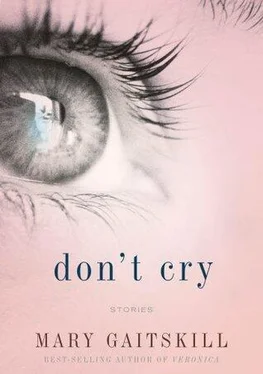Well, chaos was not unfamiliar to him. In daily life, his emotions were chaos. He let himself become a vessel for them, letting feeling roar through him, pulling him around like a kite, boiling him like water in a kettle, dissolving him in a whirl of elements. Except that normally he could go into his studio and make order. He could make songs that were satisfying containers, for the kite, the kettle, the whirl of elements — he could put each in its place. The things he was feeling now did not fit into the songs he was used to making.
Thinking he had smiled at her, the bat girl smiled back. Her smile slit open her personality and out of it tumbled sultry little demons with black curly hair, bright eyes, and naked bottoms. He let himself be distracted. He dropped down into another layer of drunkenness. One of the little demons hiccoughed and sat down heavily.
That's when he heard her say Help me. He receded more deeply into drunkenness, and, with a little shock, felt her acutely. She was reaching out to him, but he didn't know for what. He stepped deeper into himself, into the little swift-moving stream of music that always played inside him, a stream of songs running together with memory. His mother's smile was there, the one she had smiled when she was young and beautiful and ready to disappear into the dark. Her smile ran together with the smiles of girls he had loved, or tried to. Mother became an old radio song that cascaded into dozens of songs, sweet and cheap, with something real hidden inside each of them. Still he heard the call — slow and repeated— for help.
He had no ill will toward the girl. On the level that he heard her, he would've been willing to help her. But he had no idea how He propelled himself back up into his personality and stopped hearing her.
At three in the morning, Angelique had gone home, leaving the girl alone and very drunk. She was sitting on the pavement in the doorway of the vintage-record store at Sanchez and Eighteenth, the one with the silver mirror ball spinning in its window. The mirror ball was full of light from the dimly illuminated store, and out of it flew a horde of ghost lights, skimming dark walls and sleeping windows in a slow, shimmering curve. Secret and tucked away, the girl knelt beneath the curve of light, her hand on the pavement for balance. Her tapered nails and sparkling rings were fascinating against the concrete, which appeared wonderfully porous and soft, as if it had magically absorbed all the softness of the night. She was waiting for the boy to walk by Even if she couldn't talk to him, she wanted to see him.
It was a sad situation and might've been a disastrous one, except for one thing: It had caused the girl's heart to come open. This had never happened before. Because of the way her soul was hooked into her brain, whenever it had been touched by love, her brain had taken control and overruled her heart. But because of the missing place in her soul, her brain was in too much chaos to control her heart. And so it had come open for the first time. It was as if she had just discovered a hidden door leading to a place inside herself she'd never known to exist. This was a marvelous thing. Of course, she did not experience it that way; because her openness had come for someone who did not want her, she felt it as painful. And yet she made no attempt to close it. Her mind was still strong enough that she could've tried, but she didn't. The stolen piece of her soul silently compelled her to let it stay open. Her soul did this so that if it got loose, it would have a way back in. And so, without knowing what she was doing or why, the girl obeyed. She was steadfast and loyal, and she did not know it. She thought she was just a lovesick bitch. Because of what she thought, it shamed her to keep her heart open. But she did.
The ragged man approaching her on the street could see all of this from almost a block away. Significant pieces of his soul had been missing for years, and his endless search for them had caused his normal sense of sight to grow an invisible, voracious eye, which tirelessly scanned places most people would not wish to see. He saw her emptiness sucking at everything around it. He saw her open heart, full of feeling and pouring it all out. Emptiness and fullness, pulling in and pouring out with equal and opposite force, gave her an extraordinary psychic discharge more visible to him than the ghost lights. It made him curious. When he got close enough to see her, he was even more curious; she did not look like that kind of person.
Meanwhile, the boy was heading home in a taxi, bat girl in tow. He was in a philosophical mood. She was talking nonsense about art. That was okay with him. Her talk was like a glimmering curtain pulled back to reveal a stage with costumed people on it — and he was one of them. The curtain was moth-eaten and torn at the bottom, but that only made it better. The taxi turned down the mirror-ball street. He interrupted the girl. “Do you know why this is my favorite block in the city?”
She looked out the window, then looked back at him. He could tell she was thinking hard about it. He looked past her out the window; the dancing lights flirted with him and ran away. There were homeless people huddled in the dark storefront. He felt pity, plus curiosity What was it like for them? “Oh!” said the girl. “The record store?”
In fact, the ragged man was not homeless. He had a room in a tiny rotting hotel with a hot plate, a buzzing box refrigerator, and stacks of magazines piled up against a wall. People assumed he was homeless because he stank and was ragged, because he asked for change, and because he was empty like the girl. His soul hadn't been stolen; he had lost it, gradually, over a period of years. He had lost much more than she had. Unlike hers, his soul had been connected to his heart. Because his heart had been deranged by the loss, he'd tried to call back his soul by opening his mind. It didn't work, and he had been without so much of his soul for so long that his open mind was like a gaping wound. His openness had made him wise, but it was not a wisdom he could do anything useful with. His mind hurt him all the time, and the constant hurt made him full of pity for everything that hurt. But because his pity came through his mind, it translated as a thought disturbance rather than feeling, and so was hard to express. He stood before the kneeling girl full of sympathy he couldn't feel and didn't know how to express.
“Do you want money?” she asked.
“Could you help me out?” He hadn't known what else to say Reflexively he extended his hand.
“Um, hold on.” She opened her purse and pawed through it. Absently, she wondered if the man might rob her. She found her wallet, pulled a dollar from it, and handed it up to him. He took it and paused, as if trying to decide what to do. The circle of whirling lights enclosed them like a spell cast long ago and forgotten, all the force gone out of it but still haunting its spot. He was trying to remember how to talk to girls.
“That's all I can give,” she said. “I'm not rich.”
He saw she had no idea what was happening to her. Even if he could talk to her, she would not be able to answer. Sorrow and loneliness roared through him — so much force that came to nothing. He decided to try anyway. “You aren't what you think,” he said.
“I don't know what I am,” she answered.
You are a sack of things without a sack, he thought, but the thought sped by too fast. “Six farts going off in a bag,” he said. “Broke the bag and fell out.”
She gave a short, nervous laugh. Making a girl laugh — that was good. Grateful for her laughter and wanting very much to help, he decided to show her what was inside him. If you had been looking at him, you would've seen him open his coat and stand as if he were sexually exposing himself. But that gesture was symbolic. Hoping that the girl would have eyes to see, he made his coat the cover for his daily self and, in opening it, revealed the disfigurement of his soul. He did it like a leper might stand in mute greeting before another leper. He did it to show understanding and also to warn.
Читать дальше












